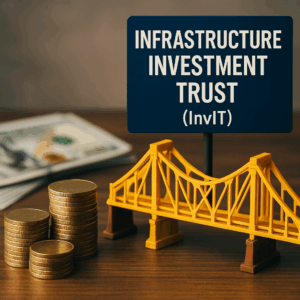As demand for reliable, long-term income grows, many investors are turning to the infrastructure investment trust (InvIT) model. These listed vehicles allow for investments in assets like toll roads and power transmission lines.
These sectors are known for steady cash flows and low correlation with traditional markets.
In this article, we’ll explore:
- What is InvIT and how does it work?
- What is the minimum investment for InvITs?
- What is the rate of return for infrastructure investment trust?
- How to invest in InvITs
- What is the difference between REIT and InvIT?
Whether you’re an expat, institutional investor, or high-net-worth individual, this guide will help you assess if infrastructure investment trusts fit into your long-term portfolio strategy.
If you are looking to invest as an expat or high-net-worth individual, which is what I specialize in, you can email me (hello@adamfayed.com) or WhatsApp (+44-7393-450-837).
This includes if you are looking for a free expat portfolio review service to optimize your investments and identify growth prospects.
Some facts might change from the time of writing. Nothing written here is financial, legal, tax, or any kind of individual advice, nor is it a solicitation to invest or a recommendation of any specific product or service.

What Is an Infrastructure Investment Trust?
An Infrastructure Investment Trust (InvIT) is a pooled investment vehicle designed to enable individual and institutional investors to earn a share of income generated by infrastructure assets.
These trusts are modeled after Real Estate Investment Trusts (REITs) but focus on infrastructure sectors such as roads, power transmission, pipelines, telecom towers, and renewable energy projects.
InvITs are typically listed on stock exchanges, offering liquidity and transparency.
They operate under a trust-based structure, where the trust holds income-generating infrastructure assets and distributes most of the cash flows to unit holders as dividends.
This makes InvITs an attractive option for those seeking stable, long-term returns.
Legal Structure and Regulatory Framework
InvITs operate under a regulated trust structure, ensuring transparency, investor protection, and compliance with financial laws.
While regulations vary by country, most jurisdictions require InvITs to adhere to standardized governance, reporting, and disclosure rules to protect investors and maintain market stability.
How Do Infrastructure Funds Work?
Infrastructure funds generate revenue primarily through stable, long-term cash flows tied to essential services.
Common revenue sources include tolls from highways, usage fees from utilities, and payments under long-term contracts with governments or private entities.
These predictable income streams make infrastructure investments attractive for investors seeking steady returns.
The assets held by these funds span various sectors such as roads, energy transmission, telecommunications networks, logistics facilities, and utilities.
Each asset type contributes to the fund’s overall income, diversifying risk and enhancing stability.
Investors typically receive periodic distributions generated from the fund’s cash flow, often on a quarterly or semi-annual basis.
This steady income stream is a key feature that distinguishes infrastructure investment trusts from other asset classes.
Who Manages the Operation of InvITs?

A typical InvIT structure includes:
- Sponsor: Establishes the trust and transfers infrastructure assets into it.
- Trustee: Holds the assets on behalf of investors.
- Investment Manager: Manages the trust’s assets and oversees operations.
- Project Manager: Handles the day-to-day operation and maintenance of the infrastructure assets.
This regulated structure provides a high degree of transparency and investor protection, which is key to attracting both retail and institutional capital into infrastructure markets.
What Is the Minimum Amount to Invest in InvITs?
The minimum investment amount in InvITs varies depending on the type of investor and the nature of the InvIT offering.
Institutional investors often have higher entry thresholds compared to retail investors, reflecting their capacity for larger capital commitments.
For publicly listed InvITs, the minimum investment is usually aligned with the market price of one trading unit, making it accessible to individual investors.
In contrast, privately placed InvITs or those targeting institutional investors may set significantly higher minimum investment requirements to accommodate larger-scale funding.
What Is the Trading Lot for InvIT Units?
The trading lot refers to the minimum number of units an investor must purchase or sell in a single transaction on the secondary market.
This lot size is set by the exchange and may vary depending on the InvIT.
For retail investors, the lot size is often designed to be affordable, making it easier to gain exposure to infrastructure assets without large capital outlays.
While InvITs offer greater liquidity than direct infrastructure investments, actual trading volume can vary.
Investors should assess secondary market dynamics, such as bid-ask spreads and average daily turnover, to understand how easily they can enter or exit a position.
What Is the Return on Infrastructure Investments?
Returns from InvITs primarily come in two forms:
- Yield: InvITs typically offer yields in the range of 8% to 10%, depending on the asset class, operational performance, and macroeconomic factors such as interest rates and inflation. These yields are distributed regularly, often quarterly or semi-annually, and are generally tax-efficient in many jurisdictions.
- Capital Appreciation: While InvITs are not typically growth vehicles, there may be opportunities for modest capital gains if the underlying assets appreciate or if operational efficiencies improve over time.
Compared to other income-generating investments like bonds or dividend stocks, InvITs often provide a higher yield and greater inflation protection.
However, unlike fixed-income instruments, returns can fluctuate based on asset performance and economic conditions.
Which Infrastructure Gives the Highest Return?
Not all infrastructure assets offer the same return potential.
Some sectors stand out for delivering higher yields or stronger growth prospects, though often with a trade-off in terms of risk or capital requirements.
- High-Return Sectors:
- Renewable Energy Projects (e.g., solar farms, wind parks): These often benefit from long-term power purchase agreements (PPAs), government incentives, and rising global demand for clean energy.
- Toll Roads: Particularly those with high traffic volumes or in fast-growing regions. Revenues are typically tied to usage, making them responsive to economic growth.
- Digital Infrastructure (e.g., fiber networks, data centers, cell towers): Increasing reliance on digital services has made this a high-growth, high-demand segment with strong return potential.
- Risk-Return Balance: While these sectors may offer superior returns, they can carry greater regulatory, operational, or technology risks. For example, toll road revenue may dip during economic slowdowns, and renewable energy projects can face policy changes.
- Sector-Specific Growth Opportunities: Emerging markets tend to offer higher returns across many infrastructure categories due to rapid urbanization and development. In contrast, developed markets often provide greater stability but lower yield.
Choosing the highest-return infrastructure investment often means balancing risk appetite, time horizon, and market trends, all while diversifying across asset types to mitigate exposure.
Infrastructure Investment Trust Pros and Cons
InvITs are increasingly favored by long-term investors seeking predictable returns.
However, like any asset class, they come with both benefits and drawbacks.
Pros
- Steady Income Through Regular Distributions
InvITs typically distribute a significant portion of their earnings (at least 90%) to unitholders, offering a consistent income stream. - Portfolio Diversification
Infrastructure assets tend to have low correlation with traditional equities or bonds, helping investors reduce overall portfolio risk. - Inflation-Linked Revenues
Many infrastructure projects such as toll roads or utility contracts have revenue structures that adjust with inflation, preserving real returns. - Transparency and Professional Management
Regulated frameworks require high levels of disclosure, and the trusts are managed by experienced professionals, often with operational expertise in infrastructure sectors.
Cons
- Interest Rate Sensitivity
As yield-focused instruments, InvITs can underperform when interest rates rise, making other fixed-income options more attractive. - Regulatory and Political Risk
Infrastructure investments are often tied to government policies, contracts, or approvals. Changes in regulation or leadership can impact returns. - Illiquidity in Some Cases
Not all InvITs are actively traded, especially those that are privately placed. This can make it harder to exit a position quickly without affecting price. - Limited Growth Potential in Mature Assets
Many InvITs invest in operational, revenue-generating assets rather than development-stage projects, which means returns are more stable but less likely to deliver high capital appreciation.
How to Invest in Infrastructure Investment Trusts
You can invest in Infrastructure Investment Trusts (InvITs) by purchasing units directly on the stock exchange, subscribing during IPOs, or accessing them through brokers and wealth management platforms.
Direct Purchase Through the Stock Exchange
Most publicly listed InvITs can be bought and sold like stocks on major exchanges.
You’ll need a brokerage account to place orders for InvIT units, typically in specific lot sizes. This method offers transparency, ease of entry, and real-time liquidity.
Initial Public Offerings and Subscription Process
New InvITs may raise capital through Initial Public Offerings (IPOs).
Interested investors can subscribe during the offer period through brokers, banks, or online investment platforms.
IPOs often come with detailed offer documents outlining expected yields, assets under management, and future growth plans.
Investing via Brokers or Wealth Management Platforms
Many brokers and wealth managers offer curated access to InvITs, including:
- Direct market access for listed InvITs
- Private placement opportunities for qualified investors
- Model portfolios where InvITs form part of a broader income strategy
What Is the Difference Between Infrastructure Investment Trust and REIT?
InvITs and REITs are both yield-focused investment vehicles that offer exposure to income-generating assets.
However, they differ in several fundamental ways:
Infrastructure vs. Real Estate
- InvITs invest in infrastructure assets such as highways, power transmission lines, renewable energy facilities, fiber networks, and ports.
- REITs focus on income-producing real estate properties like office buildings, shopping malls, residential complexes, hotels, and industrial warehouses.
Revenue Generation Models
- InvITs earn revenue primarily from long-term contracts, usage fees, and government-backed concessions. Cash flows tend to be predictable and inflation-linked.
- REITs generate income through rental agreements with tenants, which may be subject to market fluctuations and occupancy rates.
Similarities in Structure and Differences in Risk Profile
Both structures are:
- Regulated investment trusts
- Required to distribute a significant portion of their income to unitholders
- Traded on public exchanges (in many jurisdictions)
However, InvITs often offer more stable but lower-yielding returns due to their long-term, regulated nature, while REITs may present higher growth potential tied to real estate market cycles.
Infrastructure Investment Trusts offer a compelling blend of stable income, portfolio diversification, and access to essential sectors like transport, energy, and telecom.
While they carry unique risks, they can be valuable components of a long-term investment strategy.
Whether you’re seeking regular distributions or looking to hedge against market volatility, InvITs deserve consideration.
As with any asset class, aligning your investment with your financial goals and seeking professional advice is key to making informed decisions.
Pained by financial indecision?

Adam is an internationally recognised author on financial matters with over 830million answer views on Quora, a widely sold book on Amazon, and a contributor on Forbes.



